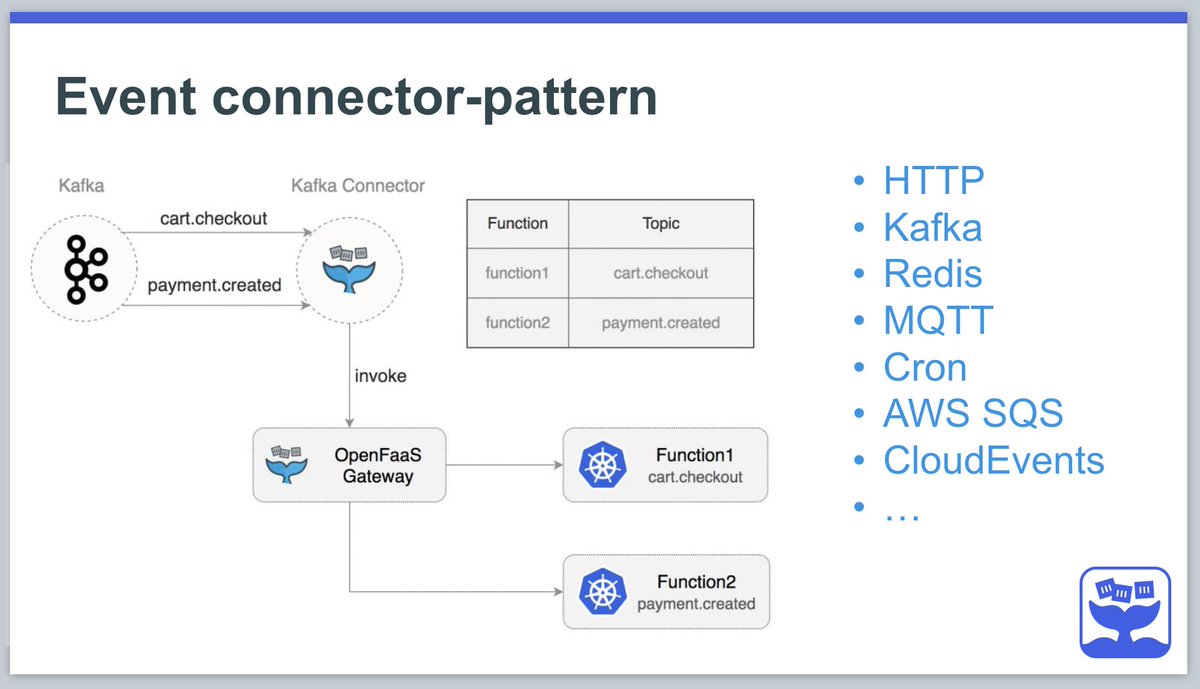This repository is a fork of the OpenFaaS Connector SDK with some features and changes.
This is useful in multi-tenant environments. If a namespace is set in the
ControllerConfiginstance, only the functions in that namespace will be mapped. Otherwise, all functions will be mapped (regardless of their namespace).config := &types.ControllerConfig{ ... Namespace: namespace, }A callback URL can be set using
AsyncFunctionCallbackURL:config := &types.ControllerConfig{ ... AsyncFunctionInvocation: true, AsyncFunctionCallbackURL: asyncCallbackURL, }A custom function can be used for topic matching to override the default equality check between received topic and function topic.
matchLowercase := func(topic, route string) bool { return strings.ToLower(topic) == strings.ToLower(route) } config := &types.ControllerConfig{ ... TopicMatcher: matchLowercase, }To give some context to the invoked functions, the topic can be sent in the invocation requests in an
X-Topicheader.config := &types.ControllerConfig{ ... SendTopic: true, }A topic may be not required in many applications. Sometimes, you just may want to invoke a specific function from your connector. The
Invokerstruct has been refactored and two new methods have been added to allow invoking a function using its name. Additionally, a map of headers can be used to send them along with the invocation request.invoker.InvokeFunction("my-function.my.namespace", message, headers) invoker.InvokeFunctionWithContext(ctx, "my-function.my.namespace", message, headers)
The connector-sdk is a library written in Go that you can use to create event-connectors for OpenFaaS functions.
How it works:
- Create a new CLI application with Go
- Add the code to subscribe to events or messages from your source - i.e. a database, webhooks, message queue
- Add the
github.com/openfaas/connector-sdk/typespackage to your code - Setup a
types.ControllerConfigwith the gateway location - Run
types.NewController - Whenever you receive a message from your source, run
controller.Invoke(topic, data)
Then whichever functions in your cluster have matching annotation of "topic: topic" will be invoked.
Each function expresses which topics it can be triggered by, the broker then invokes them using the SDK.
See also: Triggers in OpenFaaS
See the examples in the OpenFaaS Docs for inspiration.
You can copy one of them and adapt it, or see the "tester" example in this repo.
The tester example doesn't have an event subscription, but a for loop and sleep combination which simulates receiving an event. You would replace the timer with the callback function from your source such as a HTTP webhook endpoint, a pub-sub SDK or likewise.
Within the event subscriber code, you should call "Invoke()", passing in the topic and message. The functions advertise their "topic".
// Simulate events emitting from queue/pub-sub
for {
log.Printf("Invoking on topic vm.powered.on - %s\n", gateway)
time.Sleep(2 * time.Second)
data := []byte("test " + time.Now().String())
controller.Invoke("vm.powered.on", &data)
}The results can then be printed using a result receiver.
// ResponseReceiver enables connector to receive results from the
// function invocation
type ResponseReceiver struct {
}
// Response is triggered by the controller when a message is
// received from the function invocation
func (ResponseReceiver) Response(res types.InvokerResponse) {
if res.Error != nil {
log.Printf("tester got error: %s", res.Error.Error())
} else {
log.Printf("tester got result: [%d] %s => %s (%d) bytes", res.Status, res.Topic, res.Function, len(*res.Body))
}
}There are no retry mechanisms at present, but you could use the receiver to requeue failed invocations, or to send on to a dead-letter queue (DLQ).
If you expect many requests in a short period of time, you may want to defer the executions using OpenFaaS' built-in asynchronous queue.
Set the following in ControllerConfig:
config := &types.ControllerConfig{
...
AsyncFunctionInvocation: true,
}If you need to use the Content-Type header to validate or to check when it invoke the function you can set the Content-Type
in ControllerConfig:
config := &types.ControllerConfig{
...
ContentType: "application/json",
}View the code: cmd/tester/main.go
MIT
